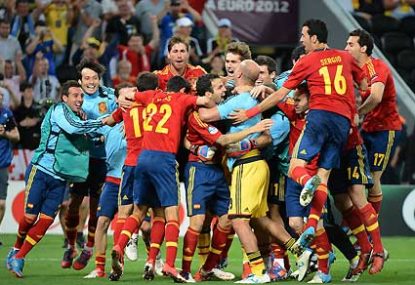abishara
new author
Roar Rookie

Hungary 1950s. Brazil 1970. Germany 1972-76. Holland 1974. Argentina 1986-90. France 1998-2000. These are the greatest international teams that the world has produced.
A new nation deserves to be added by the end of the European Championship. Regardless of the result against Italy, La Roja deserve their rightful place alongside the international greats.
Win or lose, by one goal or three, or penalties, Spain are truly one of the best ever. Everyone knows of their achievements. A third consecutive international final, the prospect of becoming the first team to win a third championship in a row drives the Spanish. Their success on the pitch is also followed by their now famous game style, etching their name in history.
In 1970, Brazil showed the world the flowing finesse of samba and scored goals galore. Holland brought “Total Football”, while the Germans showed their efficiency with their devastating counter attacking game. Argentina and France brought the ideology of building a team around star man to lead them on. Spain’s possession based game is now the envy of footballing nations. Yet it the evolution that it’s taken that deserves its credit.
In 2008, they were the underachievers. With no pressure on them and lead by Luis Aragones, they played a flowing 4-4-1-1 attacking game. They smashed Russia twice (4-1 and 3-0), broke their hoodoo against the Italians and cruised past Germany in the final.
In South Africa two years ago, they were the favourites for the first time in history. Vincente Del Bosque took over the reign and persisted with the flowing football, yet come the finals, things changed. He took the Spanish possession game to the next level, by switching to a 4-2-3-1 and introducing four central midfielders in Xavi, Iniesta, Xabi Alonso and Sergio Busquets. Five consecutive 1-0 wins highlighted their ability to control games. Once they scored, they took complete supremacy and shut down the game.
They thoroughly deserved to be champions.
This time around, once again, Del Bosque, while sticking to the basic principles of possession, brought in a Barcelona striker-less formation. Playing Cesc Fabregas up front alone, the Barcelona midfielder dropped deep to collect the ball, the ‘Messi false 9 role’. This offers Spain another outlet for possession, but provides their midfielders space as well. This is exactly the same as Barcelona.
Critics have panned the Spanish for this approach, citing their lack of attacking intent. Yet, despite this, Spain haven’t lost a game in the Championship, having conceded only two goals, scored eight and having a complete hegemony in their games, most notably against the French.
The change though is mainly because of the lack of David Villa, who has been Spain key striker for a number of years. Torres has showed glimpses of his old self, but apart from that, the forwards have struggled, Pedro and Negreado included. So Del Bosque’s “striker-less” formation seems to be working.
Controlling their nerves, they showed the true grit of champions when penalty pressure rose in the Portugal clash and didn’t crumble when Italy took the lead in the first game. Spain though has one more challenge ahead, this time against the most anti-Italian of Italian teams.
How will they fare? They are the favourites, yet again, but will they pass their Italians in oblivion? Or will they become the more Italian of the sides, score and shut down the game? Is Del Bosque going to go striker-less or throw up Torres, Pedro or Negredo?
Success or not, Spain are already one of the greats in world football. A victory in the Olympic Stadium in Kiev on Sunday night would give the Spanish, La Roja eternal greatness.
However, it matters little, for already they have it.